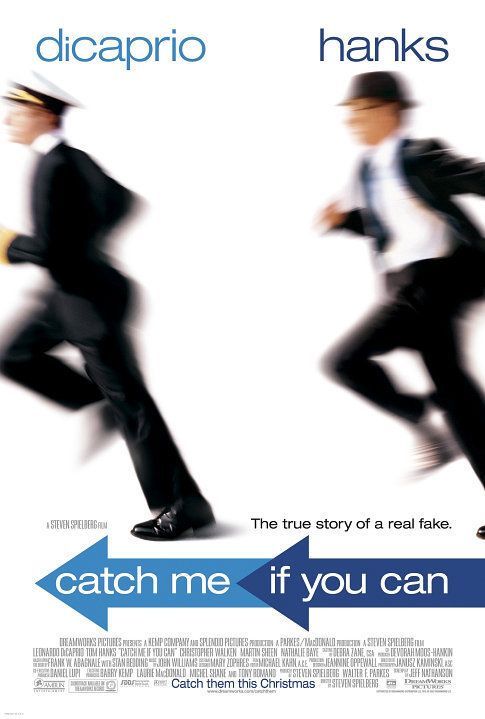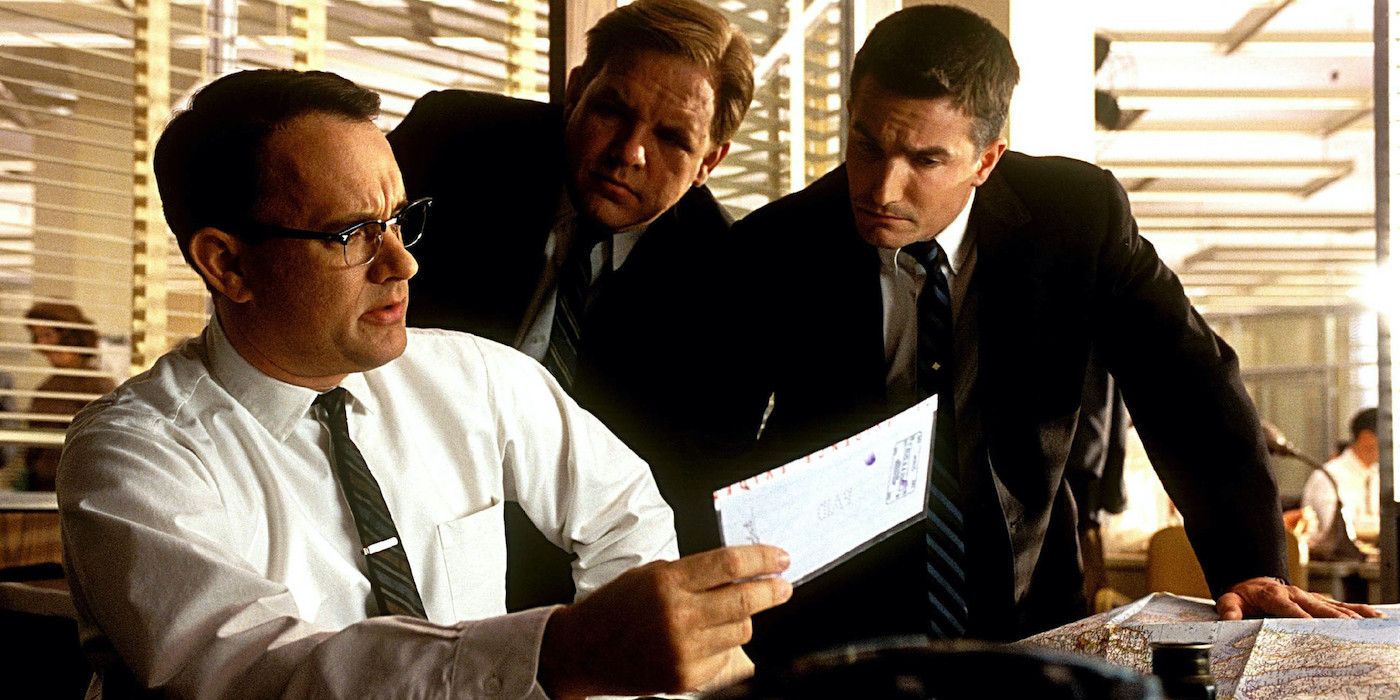The Big Picture
- The Spielberg-Hanks partnership shines in Catch Me If You Can, showcasing Spielberg's artistry & Hanks' versatility.
- Hanks surprisingly wasn't initially considered for the role in Catch Me If You Can but took a risk that paid off.
- Tom Hanks' portrayal of FBI Agent Carl Hanratty in Catch Me If You Can showcases a departure from his usual roles.
The creative partnership between Steven Spielberg and Tom Hanks is one of the most successful collaborations in the film industry. Having made five films together, Spielberg and Hanks complement each other perfectly, as both represent the idealistic values of American cinema and its respective movie stars, with the director as the preeminent blockbuster auteur and the actor as America's lovable dad. They are also producing partners, co-producing the beloved HBO miniseries, Band of Brothers. Anytime Spielberg has a project lined up, one might expect Hanks to be one of his first calls during casting. Surprisingly enough, Hanks was not initially considered to play FBI Agent Carl Hanratty in Spielberg's Catch Me If You Can. Everything changed once Hanks, the megastar that he is, proverbially cast himself in the movie.

Catch Me If You Can
Barely 17 yet, Frank is a skilled forger who has passed as a doctor, lawyer and pilot. FBI agent Carl becomes obsessed with tracking down the con man, who only revels in the pursuit.
- Release Date
- December 25, 2002
- Director
- Steven Spielberg
- Cast
- Leonardo DiCaprio , Tom Hanks , Christopher Walken , Martin Sheen , Nathalie Baye , Amy Adams , James Brolin , Brian Howe
- Runtime
- 141 Minutes
'Catch Me If You Can' is The Ultimate Steven Spielberg Film
More or less taken for granted upon release, Catch Me If You Can has now been reclaimed as one of Spielberg's best films of the second half of his storied career. The film, based on the life of career con artist Frank Abagnale Jr. (Leonardo DiCaprio), is the truest demonstration of Spielberg as an artist. On the outside, the film is a light-hearted romp centered around a cat-and-mouse chase between a suave trickster and a stodgy law enforcement agent. To its credit, Catch Me If You Can is endlessly rewatchable, as it is arguably Spielberg at his funniest. Beneath the wondrous innocence of the film and Abagnale's life is an unshakable melancholy. The film echoes Spielberg's recurring themes of growing up. Frank cons his way through life because he does not want to face the realities of adulthood, and Spielberg's resistance to growing up was a criticism thrown at him for decades. Like many Spielberg protagonists, Frank's aimlessness is attributed to his unsatisfactory relationship with his father, Frank Abagnale Sr. (Christopher Walken). Being raised by a con artist himself, Frank Jr.'s lack of transparency with his father drives him to run away.
The B-side of Catch Me If You Can follows Carl Hanratty (Hanks), the FBI Agent heading the investigation of a series of fraud scams by Frank. Carl is always right on Frank's tail, but the adolescent manages to evade arrest. Frank pivots from impersonating a Pan Am pilot to a Secret Service agent, and then a doctor. The one constant is that he is the most suave and charismatic man in the room. In other words, Frank Abagnale was a well-suited role for Leonardo DiCaprio, still the hottest name in Hollywood five years removed from Titanic. Hanks' Carl Hanratty is the antithesis of charming. Because of his complicated backstory and troubled family life, the viewer's sympathy lies with Frank. When he begins his scheme of forging Pan Am's payroll checks, we relate to him as a noble anti-hero--a modern-day Robin Hood. No one wants to see Carl, a stick-in-the-mud who treats his job like menial labor, catch Frank. How could Hanks, America's Dad and the epitome of friendliness, portray such a curmudgeon? Hanks eagerly accepted this unconventional part, even if he never received an offer.
Tom Hanks Requested to Play Carl Hanratty in 'Catch Me If You Can'
In 2002, for the release of Catch Me If You Can, Steven Spielberg sat down with Roger Ebert. In the interview, the director revealed that, while DiCaprio had been eyed as the ideal candidate to play Frank Abagnale, Hanks was not involved during the film's early development. Hanks coincidentally came across the script by Jeff Nathanson and took an interest. Knowing that Spielberg and co-producer Walter Parkes were attached, Hanks, according to Spielberg, asked Parkes, "Can I be in this movie? Do you think Steven would let me play the FBI agent? I really know who this guy is." Hanks then ominously requested permission from Spielberg to "horn in" to the film. The cryptic request was a coded way of asking if his presence would overshadow DiCaprio, who was bidding for credibility as a prestigious actor. When he received a call from Hanks asking if he could star alongside him, DiCaprio was elated. "Tom invited himself into the project in such a humble, beautiful way," Spielberg told Ebert.
Spielberg directing Catch Me If You Can, like how most Hollywood stories unfold, was a result of luck of circumstance. While Spielberg's recently established studio, DreamWorks, owned the rights to Abagnale's book, Gore Verbinski was signed on to direct. Once production was delayed to comply with the lengthy production of DiCaprio's other project, Gangs of New York, Verbinski dropped out. One of the original casting choices that stuck with Catch following Verbinski's departure was James Gandolfini, the original choice for Carl Hanratty. Eventually, Spielberg committed to directing the film himself, and Gandolfini dropped out due to scheduling conflicts caused by The Sopranos.
How Tom Hanks' Role in 'Catch Me If You Can' Differs From His Previous Work
On paper, Tom Hanks in 2002 was not a prime candidate to play Carl Hanratty, a relatively thankless role. Compared to his roles as the valiant WWII captain in Saving Private Ryan, the lovably hapless, Charlie Chaplin-esque estranged immigrant in The Terminal, or the Cold War-era lawyer negotiating the release of a CIA agent in Bridge of Spies, this Spielberg film calls for an alteration in his screen persona. Through Spielberg's tender direction and DiCaprio's effortless grandeur, the audience never associates Frank Abagnale's crimes with nefariousness. Contextually speaking, Carl is not a law enforcement officer upholding the law, he is a bully badgering this lonely and disillusioned young man finding his way in life. Despite the inherent drawbacks to one's stardom, Hanks refused to coast on his laurels. He sought after riskier parts that subverted his avuncular image as he aged into his 50s and 60s. In the same year as Catch Me If You Can, Hanks played a Prohibition-era mob enforcer in Road to Perdition. Playing Carl Hanratty allowed Hanks to deploy a distinct accent, a Boston one in this case. Anyone who has seen his peculiar turn as Colonel Tom Parker in Elvis can confirm that Hanks loves to play around with accents these days.
This is not to suggest that Tom Hanks played the root of all evil in Catch Me If You Can. Rather, the actor became inconspicuous for the first time. Steven Spielberg cited Hanks' work as his first role where he has "made a meal of anonymity... He doesn't steal any scenes; he's not trying to out-act anybody. He's just trying to play this pencil pusher whose own FBI agents don't believe all this effort is worth the trouble he's going through." Even though he doesn't get to woo beautiful women or indulge in a life of luxuries under a fake identity like DiCaprio's Frank Abagnale, Hanks flavors his unassuming role with humanism. We learn that, just like Frank, Carl is lonely, working in the office on Christmas Eve. He subconsciously identifies Frank as a surrogate son. With this character development, Catch Me If You Can evolves from a rollicking con artist comedy to a Spielbergian melodrama about the longing for family. This would've been difficult to execute without Tom Hanks, and his courage to cast himself in the film.
Catch Me If You Can is available to watch on Paramount+ in the U.S.


